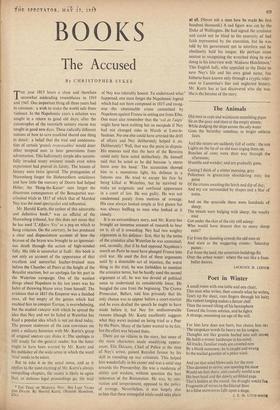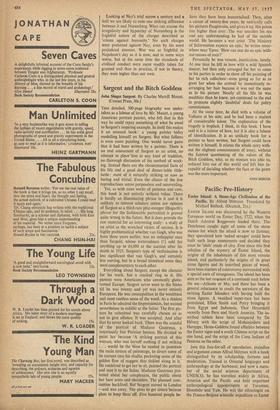BOOKS
The Accused By CHRISTOPHER SYKES THE year 1815 bears a close and therefore somewhat misleading resemblance to 1919 and 1945. One important thing all three years had in common : a wish to make the world safe from violence. In the Napoleonic years a solution was sought in a return to good old days; after the catastrophes of the twentieth century rescue was sought in good new days. These radically different notions of how to save mankind shared one thing in detail : a belief that the trial and condemna- tion of certain `grands responsables' would deter other tempted men in later generations from adventurism. This ludicrously simple idea success- fully invaded many eminent minds even when experinient had proved its falsity. The lessons of history were twice ignored. The protagonists of Nuremberg forgot the Hohenzollern anticlimax and how little the memory of Doom had helped Hitler; the 'Hang-the-Kaiser' men forgot the disastrous consequences of the Bonapartist war- criminal trials in 1815 of which that of Marshal Ney was the most spectacular and influential.
Mr. Harold Kurtz, the author of this admirable and definitive book,* was an official of the Nuremberg tribunal, but this does not mean that he has used `L'Affaire Ney' as a peg on which to hang criticism. On the contrary, he has produced a clear and dispassionate account of how the bravest of the brave was brought to an ignomini- ous death through. the action of high-minded folly. His title is somewhat at fault : this book is not only an account of the appearance of that excellent and somewhat feather-brained man before the Chamber of Peers at the height of the Royalist reaction, but an apologia for his part in the Waterloo campaign. One of the nastiest things about Napoleon in his last years was his habit of throwing blame away from himself. The evidence that in 1815 the Emperor was a finished man, all but empty of the genius which had enabled him to conquer Europe, is overwhelming, but the studied rancpur with which he spread the idea that Ney and not he failed at Waterloo has fixed a popular idea which is not yet dead today. The present statement of the case convinces me until a military historian with Mr. Kurtz's grasp of original sources can shake it. The apologia is still timely for the general reader, but the latter ought to have been warned by Mr. Kurtz and his publisher of the wide sense in which the word 'trial' needs to be taken.
But to take it in the usual sense, and, as it applies to the most exciting of Mr. Kurtz's always compelling chapters, the reader is likely to agree that, as dubious legal proceedings go, the trial * THE TRIAL. OF MARSHAL NEN' HIS LAST YEARS AND DEATH. By Harold Kurtz. (Hamish Hamilton, 25s.) of Ney was tolerably honest. To understand what happened, one must forget the Napoleonic legend which had not been composed in 1815 and recog- nise the abominable crime committed by Napoleon against France in setting out from Elba. One must also remember that the 'vol de taigle' might have been nothing but an escapade if Ney had not changed sides in March at Lons-le- Saulnier. No one else could have arrested the drift of affairs and Ney deliberately helped it on. Deliberately? Well, that was the point in dispute. His enemies said that the hero of the Beresina could only have acted deliberately. He himself said that he acted as he did because 'a storm burst over his head.' The accusation showed him in a monstrous light, his defence in a fatuous one. He tried to escape his fate by being killed at Waterloo, but he survived to make an enigmatic and confused appearance in a court of law. He was guilty. He was not condemned purely from motives of revenge. His case always looked simple at first glance but was always baffling to men who looked at it closely.
It is an extraordinary story, and Mr. Kurtz has brought an immense amount of research to bear on it, all of it rewarding. Ney had two weighty arguments in his defence : first, that by the tertns of the armistice after Waterloo he was amnestied; and, secondly, that if he had opposed Napoleon's march on Paris he must have plunged France into civil war. He used the firSt of these arguments until by a detestable act of injustice, the worst thing in the trial, he was forbidden to mention the armistice terms, but he hardly used the second argument at all; he was too devoid of political sense to understand its considerable force. He bungled the case from the beginning. The Crown Prosecutor, Bellart, told him privately that his only chance was to appear before a court-martial and he even drafted the speech he ought to have made before it, but Ney for undiscoverable reasons (though Mr. Kurtz excellently suggests what they were) insisted on being tried as a Peer by the Peers. Many of the latter wanted to be fair, but the effort was beyond them.
There are no villains in the story, but some of the main characters made unedifying appear- ances. Elie Decazes, Chief of Police at the time of Ney's arrest, gained Royalist favour by his skill in rounding up war criminals. This helped him wonderfully in his career and was a solid step towards the Premiership. He was a moderate of ability and wisdom, without question the best statesman of the Restoration. He was, by con- viction and temperament, opposed to the policy of revenge. Nevertheless, it was largely due to him that these revengeful trials could take place at all. (Never ask a man how he made his first hundred thousand.) A sad figure was cut by the Duke of Wellington. He had signed the armistice and could not be blind to the enormity of bad faith represented by the execution, but he was told by his government not to interfere and he obediently held his tongue. He perhaps came nearest to recognising the wretched thing he was doing in his interview with 'Madame Hutchinson.' This English lady, who appealed to the Duke to save Ney's life and his own good name, has hitherto been known only through a cryptic refer- ence in Lamartine's fine and neglected history. Mr. Kurtz has at last discovered who she was. She is the heroine of the story. Looking at Ney's trial across a century and a half we are likely to note one striking difference between it and Nuremberg. What can excuse the irregularity and hypocrisy of Nuremberg is the frightful nature of the charges described as 'crimes against humanity.' No such charges were preferred against Ney, even by his most prejudiced enemies. War was as frightful in Napoleon's day as it is now, and in some ways worse, but at the same time the standards of civilised conduct were more readily taken for granted and thus in practice, if not in theory, they were higher than our own.



































 Previous page
Previous page